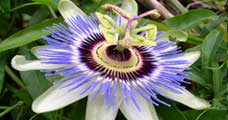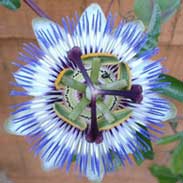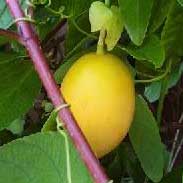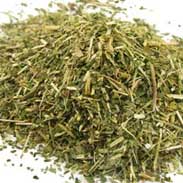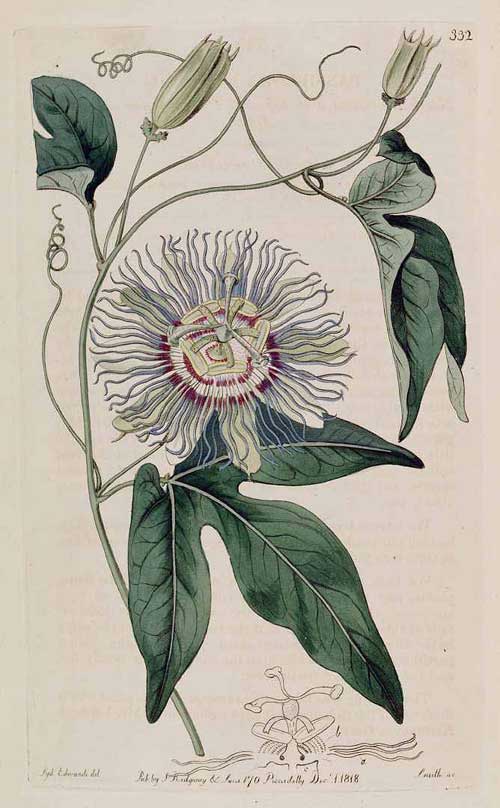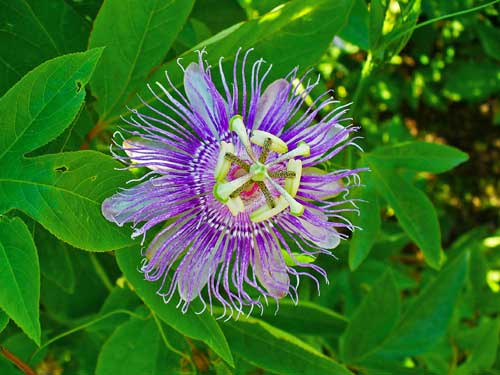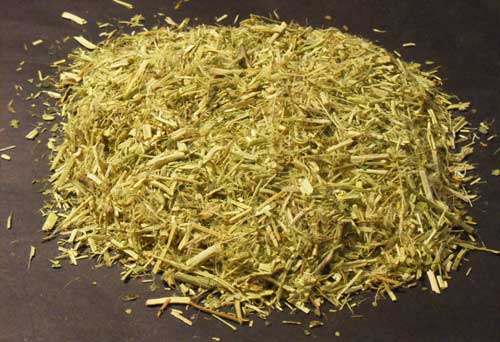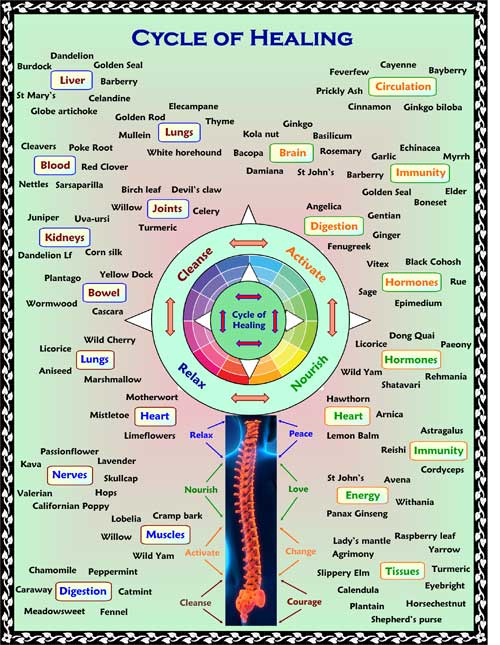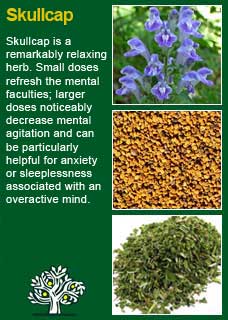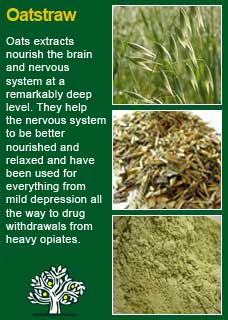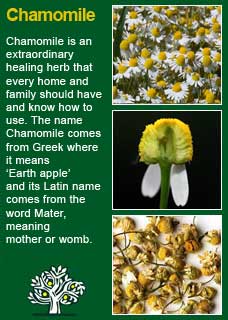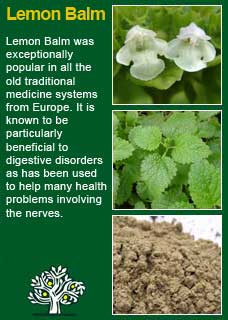
|
|
||||
| Our Pages ABOUT CONSTITUTIONAL MEDICINE
|
In herbal medicine we include all the dried aerial parts that remain after harvesting the fruit from the lovely Passionflower (which is indeed the same plant that produces 'Passionfruit') Passionflowers are long lived, climbing herbs that grow absolutely incredible flowers. There is some interesting history behind the name -- In the mid-1560s a medical doctor by the name of Nicholas Monardes of Seville came across this herb in the Peruvian Andes. It is said that he was a humane and devout man who was tortured by what he had seen happen at the hands of his conquistador compatriots. As he sought solace and refuge in the mountains he came across this exotic plant and had a vision of how it represented the 'passion' of Christ. He saw the five wounds of Christ in the five stamens, he saw purity in the white colour and heaven in the blue, he saw the three nails of the cross in the three styles, a hammer in the ovary of the flower, a crown of thorns in the corona and the 10 true disciples in the 10 petals; and so he christened it Passionflower.
In the Yucatan it was an old remedy for insomnia, hysteria and convulsions in children. The Algonquin Indians brewed it to soothe their nerves and the Houmas used it as a tonic in their water. 19th century eclectic physicians used Passionflower as an important remedy for insomnia, restlessness, menstrual discomforts, diarrhoea, epilepsy and whooping cough. Dr Michael Weiner in Weiner's Herbal writes 'Passionflower may be our best tranquiliser' TJ Lyle writes of doses of the fluid extract between 10 and 20 drops, 'this is a reliable relaxing and somewhat stimulating antispasmodic nervine. It relieves excitement of the nervous system, and is of much benefit in spasmodic and neuralgic diseases, insomnia, the delirium of typhoid, the convulsions of children. It also relieves irritation of the brain centres and quiets the general nervous system. Passiflora will be found serviceable in epilepsy, lessening the frequency and severity of the paroxysms and a large dose given at the right time may occasionally abort a paroxysm. It frequently relieves the tonic spasm of meningitis and is of service in tetanus especially if combined with Lobelia. It will also be found very serviceable in the spasms produced by strychnin poisoning. The sleep produced by passiflora is natural, restful and refreshing and hence gives good results in insomnia' F Ellingwood writes 'in the convulsions of childhood it is a most reliable agent. The writer has given it at the onset of the spasm when the approaching symptoms were unmistakable, and has had the satisfaction of seeing all the symptoms disappear so promptly, that confidence has become established. It has controlled severe spasms while the irritating causes yet remained, and after all antispasmodics except anesthesia have been ineffectual. It can be relied upon to hold the spasms in check while the causes are being removed, and reduces their force and character. H Felter writes 'Passiflora is used chiefly in spasmodic affections and as a rest-producing agent. While somewhat hypnotic but acting slowly, it is better as a nerve calmative, rest resulting from its quieting influence, and sleep following in consequence of this rest rather than through any narcotic effect of the drug. It is one of the best agents we possess to allay restlessness and overcome wakefulness, when the result of exhaustion, with cerebral fullness, or due to the nervous excitement of debility. King's Dispensatory writes 'We have observed some individuals appear to be very susceptible to its effects in even small doses. Moderate doses act as an antispasmodic and are somewhat hypnotic. Its force is exerted chiefly upon the nervous system, the remedy finding a wide application in spasmodic disorders and as a rest-producing agent. It is especially useful to allay restlessness and overcome wakefulness, when these are the result of exhaustion, or the nervous excitement of debility. It proves especially useful in the insomnia of infants and old people. It gives sleep to those who are labouring under the effects of mental worry or from mental overwork. It relieves the nervous symptoms due to menstrual disturbances, and the nervous irritability resulting from prolonged illness. The sleep induced by Passiflora is a peaceful, restful slumber, and the patient awakens quiet and refreshed.John Heinerman relates how an old friend of his by the name of T.W. Edwards of Memphis, Tennessee, who was a famous herbalist who treated folks for miles around using nothing but herbs from the woods and meadows of his state swore that 'Passionflower was the perfect medicine to give hyperactive kids or adults as well as senior citizens suffering from tranquiliser addictions' The British Herbal Pharmacopoeia (BHP) describes Passionflower's actions as sedative, hypnotic, antispasmodic & anodyne and says it is indicated for 'neuralgia, generalised seizures, nervous tachycardia, spasmodic asthma' and specifically indicated for insomnia. The BHP suggests a dose of 0.25-1 gms or by infusion and suggests a tincture in the ratio of 1:8 in 45% ethanol. Thomas Bartram says Passionflower's actions are 'hypnotic (sleep inducing), vasodilator, antispasmodic, mild sedative and analgesic without leaving depression, hypotensor, tranquiliser, CNS relaxant, strengthens the heart muscle'. He recommends it can be used for 'sleeplessness due to mental restlessness, nervous excitability, over-active brain, hyperactive children, twitching of limbs, neuralgia, constrictive headache, temporary relief of tremor in the elderly. For Benzodiazapine and Valium addition, to assist withdrawl. For rapid heart beat, the pain of shingles (partial relief) and anxiety neurosis with Hawthorn in equal parts'
Passionflower contains substances such as maltol, ethyl-maltol and flavonoids that are believed to contribute to its relaxing effects. It also has substances that appear to have a more stimulating action (harmala chemicals which have been shown to dilate the coronary arteries) and researchers conclude the herb has a 'complex activity' on the central nervous system. Numerous positive clinical studies have now been conducted with Passionflower and the European Scientific Cooperative on Phytotherapy recommends Passionflower for treating nervous tension, restlessness, irritability and difficulty falling asleep (ESCOP monographs, Passiflorae herba, UK, July 1997) ~ In a randomised, double-blind, placebo-controlled trial Passionflower extract was found to be as effective as oxazepam (a powerful benzodiazepine drug in the Valium class) for managing generalised anxiety disorder however it was noted that the Passionflower resulted in no incidence of a reduction in job performance unlike what was seen in the drug arm of the trial. The dose used was 45 drops of Passionflower extract per day (Akhondzadeh S et al: J Clin Pharm Ther 26(5):363-367, 2001) ~ A randomised, double-blind, placebo-controlled study showed that a single large dose of Passionflower demonstrated a sedative effect compared with baseline values in healthy female volunteers (Schulz H, Jobert M, Hubner WD: Phytomed 5(6):449-458, 1998) ~ A randomised, double-blind, placebo-controlled 14 day trial compared clonidine (an alpha-2 adrenergic agonist, maximum dose 0.8mg/day) plus Passionflower extract against clonidine plus placebo in the outpatient detoxification of opiate addicts (i.e. heroin or morphine) ~ A controlled study that compared high doses of Passionflower and Valerian extracts against chlorpromazine (an antipsychotic drug), electro-encephalograph (EEG) recordings showed sedative activity after 6 weeks of the herbal combination. The same combination was shown to improve symptoms of insomnia in further studies and it was noted that the side effects that are characteristic of drug sedatives were not observed with the herbs (Kammerer E, Wegener T: Natura Med 10(2):1-8, 1995) ~ A randomised, double-blind, placebo-controlled trial showed that a combination of Passionflower and Hawthorn extracts reduced heart rate at rest, reduced diastolic blood pressure during exercise and improved exercise capacity compared with placebo in stage 2 heart failure patients (von Eiff M et al: Acta Ther 20:47-66, 1994) ~ The authors, titles and the 'where-and-when' published of over 60 further studies and articles on Passionflower are listed in a PDF found here
For some years now, against this proven and safe way of herbalism, there has been a rising tide of excessive caution and scare-mongering in many parts of the world. The same authorities that, not so long ago, decried herbal medicines as ineffectual, have now taken up a different adversarial position; that they are dangerous substances that should only be prescribed by Doctors, who of course have zero training in them. Unfortunately, the same unnecessary fear and worry has crept into many natural health websites and popular publications on herbs. Herbs that we have safely used for thousands of years, that have no reports of adverse reactions in the medical literature despite widespread use by millions of people, are suddenly described as contraindicated because of something that should have been seen as completely unimportant, or at the utmost a merely theoretical concern, such as a laboratory study on one of the herb's constituents to use an all too common example. I wonder sometimes if the writers of such articles feel that the herb will be more deserving of respect if it is thought to be a little bit dangerous, in other words more like a drug than something that has simply come out of the earth and been used by ordinary people for generations beyond count. There is just so much misinformation about herbal medicine on the internet now. Ludicrous claims and cautions abound in equal measure; it seems like one group are trying to make money out of the public whilst the other are busily trying to scare them off. I have to believe that the kind of reader who takes the time to read pages on herbs that are as extensive as this one is much less likely to be swayed by marketers or misinformers. I hope that you will keep your wits about you if you get conflicting opinions from people who have never really got to know these herbs, who have never worked with them, or learned how to use them safely and effectively. I want to remind you that the reason that herbs can never be patented and owned by any individual or corporation is because they are, and always will be, the People's medicine. They belong to all of us and it is my great hope in sharing this work that you will learn how to use them wisely for yourself, and the people you care for. Be safe, but do not be afraid.
I use a very great deal of Passionflower in my work and consider it to be one of the finest medicines from Nature to help 'knit up the ravelled sleeve of care' (Shakespeare). Passionflower has a mellow and meditative effect on people. I have found it incredibly helpful for people who are plagued by an overactive mind and nervous system that will not let them rest and relax. I've also found that small doses (as little as 10 drops of the tincture for a more sensitive person, perhaps double that for someone who needs a stronger action to feel the effect) during the day can have an excellent effect on symptoms of excess nervous tension with no loss of concentration or alertness. If you who are reading this are studying herbal medicine or simply have your own reasons to want to know this potent plant ally at a much deeper level, then I warmly recommend you conduct an experiment in the 'laboratory' of your own body and take a therapeutic dose of the tea or tincture of Passionflower and see what happens! You would have to be made of stone to not feel anything and think that the more you do this with an open and attentive mind the more you will be able to feel how this herb clearly calms and soothes the whole nervous system - it is quite lovely! Further to this, if you would like to learn more about the ancient art of pulse testing, a simple but powerful way to ask the intuitive intelligence of the body for its responses to a herb by feeling the pulse whilst giving a tiny dose by mouth, read here I have the highest regard for the combination of Passionflower with Skullcap for problems related to the head such as nervous tension, worrying, anxiety, constant thinking, or even physical pain or discomfort in the head. Passionflower also combines perfectly with Chamomile for tension in the spine and belly, with Oatstraw for an exhausted 'strung-out' nervous system and with Lemon Balm for such functional heart troubles as cardiac anxiety, palpitations, arrhythmias etc.
Much of the information here about the traditional uses of Passionflower is consistent with the model of thinking whereby one may treat problem A with plant B. There is value in this approach, especially in how it helps us pass on useful knowledge to one another, but it falls short in one vital area; and that is that people are not all cut from the same cloth! Something that works brilliantly for one person may do less for another -- why is this? Part of the reason is that people vary in their constitutions as to whether they are either hotter or cooler and, at the same time, either dryer or damper. This useful and rather fascinating subject is introduced further here Another big part of using the right herb when it is most needed comes from understanding the need to treat what is going wrong for the person that had led up to their getting a health condition. In this light,Passionflower can particularly offer its benefits when a relaxing action is needed in the 'cycle of healing', more about this here
Please understand that I cannot advise you, including on products or dosage, without seeing you in person in my clinic but for ideas
on how you might find a good herbalist in your area read here |
|
|
© 2011 R.J.Whelan Ltd
